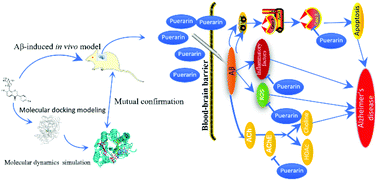当前位置:
X-MOL 学术
›
Food Funct.
›
论文详情
Our official English website, www.x-mol.net, welcomes your feedback! (Note: you will need to create a separate account there.)
The in silico and in vivo evaluation of puerarin against Alzheimer's disease
Food & Function ( IF 6.1 ) Pub Date : 2019-01-08 00:00:00 , DOI: 10.1039/c8fo01696h Song Liu 1, 2, 3, 4, 5 , Xiao-Lu Cao 1, 2, 3, 4, 5 , Guang-Qi Liu 1, 2, 3, 4, 5 , Tong Zhou 1, 2, 3, 4, 5 , Xi-Liang Yang 1, 2, 3, 4, 5 , Bing-Xin Ma 6, 7, 8, 9, 10
Food & Function ( IF 6.1 ) Pub Date : 2019-01-08 00:00:00 , DOI: 10.1039/c8fo01696h Song Liu 1, 2, 3, 4, 5 , Xiao-Lu Cao 1, 2, 3, 4, 5 , Guang-Qi Liu 1, 2, 3, 4, 5 , Tong Zhou 1, 2, 3, 4, 5 , Xi-Liang Yang 1, 2, 3, 4, 5 , Bing-Xin Ma 6, 7, 8, 9, 10
Affiliation

|
The root of Pueraria lobata has been utilized as a food source for thousands of years in China. Puerarin is the major bioactive and the most abundant secondary metabolite obtained from the root of P. lobata. The potential therapeutic effect of puerarin against Alzheimer's disease was screened by in silico methods and confirmed by the amyloid β-peptide-induced Alzheimer's disease (AD) rat model. The in silico study displayed that puerarin had the potential to penetrate across the blood–brain barrier and had high stability in molecular docking and dynamics simulation with acetylcholinesterase (AChE), cyclooxygenase-2 (COX-2) and caspase-3 (C3), which play a central role in the development of AD. The in vivo results showed that puerarin could restrain the AChE activity, restore the activities of antioxidant defense substances toward normal levels, and decrease the expression of inflammatory factors and apoptosis genes in the brain, especially down-regulating the expressions of COX-2 and C3. The histopathological examination of brain sections and behavioral testing also verified the biochemical observations, which further validates the in silico study. These results not only suggest that puerarin, as a potential compound, could relieve AD, but also broaden the applications of puerarin.
更新日期:2019-01-08



























 京公网安备 11010802027423号
京公网安备 11010802027423号